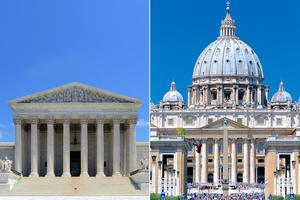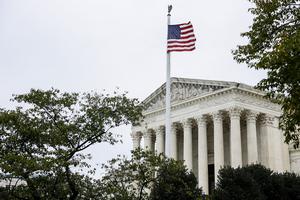US Religious-Liberty Policy Has Worldwide Consequences
COMMENTARY: If America loses its enthusiasm for defending religious liberty, what are the implications for religious believers now being horribly persecuted all over the world?

Progressives have joined forces with anarchists in an attempt to “cancel” religious freedom in the United States. It’s a creepy alliance. If they succeed, the people who will suffer most are Christians and other religious minorities abroad. It has never been more important that American Catholics stand up for our country’s first freedom.
It may seem like ages ago, but just last October, Attorney General William Barr gave a powerful speech on freedom of religion in America at Notre Dame Law School. Now would be a good time to reread it. Barr traced the central role of religious liberty in our nation’s history and the importance of a morally disciplined and virtuous citizenry for maintaining a free government such as ours. He also spoke of the threat of secularism and moral relativism. “The problem is not that religion is being forced on others,” explained the nation’s highest law enforcement officer. “The problem is that irreligion and secular values are being forced on people of faith.”
The speech was applauded by conservatives and (not surprisingly) mocked by the mainstream media. Jeffrey Toobin, perhaps best known as a senior legal analyst for CNN, positively exploded with indignation in an article for The New Yorker. “William P. Barr just gave the worst speech by an Attorney General of the United States in modern history,” he wrote. A New York Times opinion piece went a step further. “Mr. Barr has embraced wholesale the ‘religious liberty’ rhetoric of today’s Christian nationalist movement. When religious nationalists invoke ‘religious freedom,’ it is typically code for religious privilege. The freedom they have in mind is the freedom of people of certain conservative and authoritarian varieties of religion to discriminate against those of whom they disapprove or over whom they wish to exert power.” In other words, it attributed malicious intent to the attorney general, ironically in an article dripping with malice.
Fast-forward several months and add a worldwide pandemic.
In mid-March, as initial restrictions were implemented across the country, Barr reinforced the importance of religious freedom in a statement on religious practice and social distancing:
“[E]ven in times of emergency, when reasonable and temporary restrictions are placed on rights, the First Amendment and federal statutory law prohibit discrimination against religious institutions and believers. Thus, government may not impose special restrictions on religious activity that do not also apply to similar nonreligious activity. … Religious institutions must not be singled out for special burdens.”
Despite the clarity of Barr’s statement, some states did not take notice. A Christian church in Nevada, for example, is seeking relief in federal court from Gov. Steve Sisolak’s preposterous executive order subjecting churches in the state to strict numerical limits on congregants at religious services while allowing casinos to operate at 50% capacity.
Meanwhile, anarchists have taken aim at religious freedom by manipulating what began as protest of the death of George Floyd at the hands of Minnesota police into an excuse for civil unrest detached from any true commitment to justice. Religious statues have been felled and desecrated. Churches have been burned. To quote President Donald Trump in an executive order issued in late June, “many State and local governments appear to have lost the ability to distinguish between the lawful exercise of rights to free speech and assembly and unvarnished vandalism. … Some particularly misguided public officials even appear to have accepted the idea that violence can be virtuous and have prevented their police from enforcing the law and protecting public monuments, memorials, and statues from the mob’s ropes and graffiti.”
His executive order continued: “It is the policy of the United States to prosecute to the fullest extent permitted under Federal law, and as appropriate, any person or any entity that damages, defaces, or destroys religious property, including by attacking, removing, or defacing depictions of Jesus or other religious figures or religious art work.” This policy is fundamental to religious liberty in this country; that we need to be reminded of it is profoundly worrisome.
You do not have to be a supporter of the president to recognize that he prioritized the subject of religious freedom within the State Department. This past June, he issued an executive order that stated unambiguously that “religious freedom for all people worldwide is a foreign policy priority, and the United States will respect and vigorously promote this freedom.” The order prioritizes international religious freedom in foreign policy and overseas government-aid projects, allocates $50 million annually for programs that advance religious liberty worldwide, and requires relevant State Department officials to undergo training in international religious freedom.
The order received almost no media attention. This should come as no surprise. Other advances by this administration for international religious freedom have also been met with “meh.”
Two years ago, for example, Secretary of State Mike Pompeo convened a Ministerial to Advance Religious Freedom, inviting foreign ministers, other representatives from civil society, and religious leaders to “discuss challenges, identify concrete ways to combat religious persecution and discrimination, and ensure greater respect for freedom of religion or belief.” Last summer Pompeo hosted the second ministerial, this time attended by representatives of more than 100 countries. It was the largest human-rights conference ever held at the State Department and ended with the creation of an International Religious Freedom Alliance to “bring like-minded countries together to confront challenges of international religious freedom.” This year’s gathering was supposed to be held in mid-July in Poland, one of the country members of the alliance. It has been postponed until November and will be held on a much smaller scale than initially planned.
Tom Farr, president of the Religious Freedom Institute in Washington, D.C., makes a strong case for America’s continued leadership in advancing international religious freedom: “The world is experiencing a growing global crisis of religious freedom. Violent religious persecution, severe government restrictions, and rising social hostilities challenge religious freedom in every region of the world.” The evidence for this claim is overwhelming. Unfortunately, neither the Democratic Party nor the mainstream media are familiar with it — or, if they are, they don’t seem to care.
If America loses its enthusiasm for defending religious liberty, what are the implications for religious believers now being horribly persecuted all over the world?
Father Benedict Kiely, a priest of the Personal Ordinariate of Our Lady of Walsingham and the founder of Nasarean.org, dedicated to relieving the suffering of Christians in the Middle East, wrote an opinion piece for the Daily Caller at the beginning of July. He pointed out that the already diabolical harassment and murder of Christians in Iraq, Syria and Nigeria has increased during the coronavirus pandemic: “One factor unites all these stories, and all the suffering endured by Christians persecuted for their faith across the globe — an almost total media silence in the mainstream media, which has been accompanied by very little attention and passionate concern from leadership in the Churches of both the United States and Europe.”
Shockingly, that silence extends to the plight of the Uighurs in China. It is beyond question members of this Muslim ethnic group are being herded by Beijing into “reeducation” camps that employ torture and other grotesque methods to pressure Uighurs to abandon their religion and culture. Sam Brownback, our ambassador-at-large for international religious freedom, has consistently spoken out against the atrocities of China’s assault on religious freedom. That kind of push back must continue.
Now is a crucial moment for ordinary folks like you and me to understand what’s at stake and shore up religious freedom at home and abroad. Let me put this as plainly as possible: If America’s desperately important policy of defending religious freedom around the world is brushed aside, that is wonderful news for dictators, torturers and sinister specialists in religious “reeducation” everywhere. Whether the Church will step into the breach is an open question. Therefore, ordinary Catholics must mobilize. There is no time to lose.
Andrea Picciotti-Bayer is a legal analyst and regular Register contributor.
















